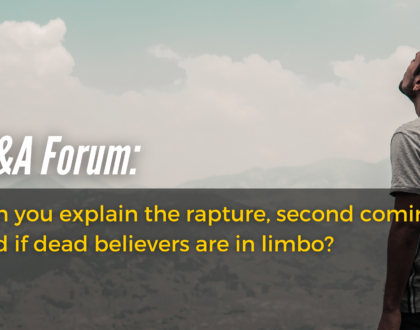Is The Bible Reliable?
by Westminster
By Matthew Ruttan
January 2017
You can hear the full podcast that discussed the brochure/blog below here: “Confident Convictions”
Introduction
The Bible is the world’s best seller. It’s also the most shop-lifted! It’s been translated into hundreds upon hundreds of languages and has had a massive impact on humanity. But since it’s where we learn so much about God and life we need to answer this vital question:
Is the Bible reliable?
This short brochure won’t answer every question. It will help with some, and possibly raise some more. I’m a pastor, so I’m convinced that it is reliable. But I wanted to share some information that is often overlooked. My hope is that this will give you more confidence in it’s story and teachings, and will encourage you in your journey of faith.
1. When was the Bible written?
Although the Bible looks like one book, it’s really a library of books in one binding. So instead of being written over the course of a year (like a book you’d buy today), it was written over hundreds and hundreds of years. Some stories would have been collected several thousand years ago. But the latest book in the Bible (Revelation) was probably written in about the year 100. What we call the “Old Testament” was being used in Jesus’ time (2000 years ago)—and the first time we see a list of the 27 books of what we call the “New Testament” was in a letter by a church father in the year 367.
2. Who wrote the Bible?
Many different writers wrote and edited the books in the Bible. Sometimes they identified themselves (like in the letter to the Romans—Paul), and sometimes they did not (like in the letter to the Hebrews). But Christians have long held that although various people wrote down the words, God is the ultimate author of the Bible because he inspired their hearts to include the words he wanted his people to have for all time.
3. What do people mean when they say the Bible is “inspired by God”?
According to Bible scholar NT Wright, to say the Bible is “inspired” can mean that the Holy Spirit “guided the very different writers and editors, so that the books they produced were the books God intended his people to have.” Because of this, God can still communicate to us through the Bible. In this way it’s not a dead history book. Instead, as it says in Hebrews 4:12, it is “living and active, sharper than any two-edged sword…” The Prophet Isaiah eloquently said that “The grass withers and the flower fades; but the word of our God stands forever.” (Isaiah 40:8) And in 2 Timothy 3:12, Paul writes that “All scripture is inspired by God…”
4. Who decided what books to include in the Bible?
With respect to the Old Testament, there wasn’t a specific “moment” when everything came together at once. Some suggest that many in the Jewish community were collectively using many early writings by the time of King David (about the year 1000 BC). As time went on, books would have been added, like the prophetic books and psalms. Even by the time of Jesus the order of books was not fixed.
With respect to the New Testament, despite what you may have heard in popular (and misleading) movies like The Da Vinci Code, for a book to be considered scripture it needed (a) to have been written near to the time of Jesus, (b) to have been written by an apostle (one of the original 12 disciples or Paul) or companion of an apostle, (c) to have had wide-spread acceptance among churches, and (d) to have included right teaching. This happened over a long period of discussion and debate. Through it all, the Holy Spirit guided God’s people to ensure they had access to the books that told his unfolding story.
5. What is in the Bible and what’s it all about?
The Bible includes different stories, histories, poems, and wisdom literature. Because of that, it’s hard to summarize! But I’ll do my best. The Bible tells the story of God and his people. It is a story of love, truth and purpose. It tells how God created everything; how sin entered the world; how God chose a special people (Israel) to bless the world; how the Messiah (Jesus) came as Saviour and as God’s representative; and how the church continues to serve God’s purposes to redeem and renew humanity and creation. The Bible also tells us some things about what will happen at the end of history when Jesus returns to judge humanity and usher in “the new heavens and the new earth.” In a word, the Bible is a love story between God and his people—and the hero is Jesus.
6. Why is the Bible so authoritative to Christians?
It’s authoritative because it’s the primary place where we learn about God’s will. Although we can learn some things about God from nature and life in general, it has a unique place in our lives. If you want to know what the moon is like talk to Neil Armstrong. If you want to know what God is like, read the Bible. Further, as you’ll see in question 10, Jesus himself treats it as authoritative. Within the Bible itself, it’s authors confirm divine origin. Plus, God’s people have affirmed its use as authoritative for thousands of years and we stand in solidarity with them as an ongoing, dynamic community of faith. Perhaps most convincingly, the Bible has had a massive impact in the lives of millions of people to effect good in our world… feeding the hungry, clothing the poor, securing clean water, fighting for justice and human rights, protecting the environment, building hospitals, advocating for education, praising him, etc.
7. Do we have any ancient manuscripts of the Bible?
Yes. History has preserved 838 manuscripts and fragments from the first thousand years after Jesus. To put that in perspective that towers over other ancient documents in a near-miracle of preservation. For example, the Magna Carta, the foundational document for modern British law, is about 800 years old and today only four copies exist. Not only do we have 838 manuscripts and fragments of the New Testament from the first 1000 years, but when we look to the next thousand years, that number steamrolls to 14,000!
And even though we don’t have manuscripts that can be carbon-dated to the exact day of Jesus, there is evidence in the Bible that the manuscripts themselves were eyewitness testimony and were records that were written down soon after the events happened. For example, in 1 Corinthians 15:6 Paul says that Jesus appeared after his resurrection “to more than five hundred brothers and sisters at one time, most of whom are still alive, though some have died.” It’s a way of saying that these living people are actual witnesses to Jesus and could be consulted because they were still alive when Paul was writing his letter.
The Bible and its stories have been incredibly preserved.
8. Why do some people call the Bible “the Word”?
When people say “the Word” they usually mean the Bible. What they mean is that the Bible is like a word from God’s mouth speaking to us. Not to complicate things, but the true capital-W Word is Jesus (see John 1:14 where it says that God’s Word became flesh and lived among us), and we call the Bible the Word of God because it points us to and teaches us about Jesus, the living Word.
9. How can we trust what the biblical writers say? Couldn’t they have just made it up?
It would have been hard for them to make up details. The reason for this is because there were so many witnesses alive and telling the stories that it would have been very easy for them to stomp out untruths. But that didn’t happen. The movement continued to grow, massively. Not only that, but it grew with great consistency about what happened—for example, that Jesus had taught X, Y and Z, suffered crucifixion, was raised after three days and seen by many witnesses. Not only that, but the stories include elements of what some scholars call “eyewitness memory”—details that tell us the writers were recording what they saw. C.S. Lewis was a world-class literary critic. He said it was not customary to include these kinds of details based on the literary conventions of the day. As Lewis said, “I have been reading poems, romances, vision literature, legends, and myths all my life. I know what they are like. I know none of them are like this.” He then calls the Gospel stories “reportage”—i.e. stories people reported based on personal experience.
Further, the writers voluntarily included details that would have actually hurt their cause (and not help it). For example, the Gospels tell us that the women were the first ones to see the risen Jesus at the tomb. But in the first century, a women’s testimony was not considered trustworthy enough to be admissible in court. Thankfully we’ve moved past that mentality. But the reason those details are there is most likely because that’s how it actually happened. If conspirators wanted to make a story sound credible, they certainly wouldn’t have included details that would make it less believable to many people!
10. What did Jesus think about the Bible?
Jesus frequently appealed to the authority of scripture. It should be noted, however, that in his day, scripture—or the Bible—would have been what we call our Old Testament. (The process of which New Testament books would be considered scripture was still happening.) But Jesus quoted the Bible (Old Testament) in religious debates with scholars, and many of the most famous things Jesus said were actually quotes from the Old Testament, such as “love your neighbour as yourself” (Leviticus 19:18), and “man does not live on bread alone” (Deuteronomy 8:3), and to love God with all your heart, soul, mind and strength (Deuteronomy 6:5). Jesus also said in John 10:35 that scripture “cannot be set aside” and that his words “will never pass away” (Mark 13:31).
It should also be noted that very early in the Christian movement, Jesus’ words were considered authoritative (see 1 Corinthians 7:10, 9:14) and at least once quoted as scripture (1 Timothy 5:18b). This was also happening for the writings of the apostles (2 Peter 3:16).
11. Why are there so many different translations?
Most of the Old Testament was written in Hebrew, with a few parts in Aramaic. The New Testament is written in Greek. So through time, different scholarly teams of translators try to translate those ancient words into today’s English so that they make sense to modern readers. A part of the difficulty is that English changes through time. For example, “cool” used to just refer to temperature, but now it can also mean something that is likeable or stylish.
Some translation teams also take different approaches. Some take a word-for-word approach, and some take a meaning-for-meaning approach. For example, in the NRSV translation of 2 Timothy 3:16, it says: “All scripture is inspired by God and is useful for teaching, for reproof, for correction, and for training in righteousness…” That is mostly a word-for-word approach. But the NLT translation takes a meaning-for-meaning approach with the hopes of making it even more understandable: “All Scripture is inspired by God and is useful to teach us what is true and to make us realize what is wrong in our lives. It corrects us when we are wrong and teaches us to do what is right.”
In short, different teams of translators do their best to help us understand what the original manuscripts meant.
12. Why do we always read the Bible in church?
Since the earliest days Christians have gathered to worship together—and that includes the Bible. That’s because it’s the primary place where we learn about God’s will—and since we’re his people, that’s pretty important to us! Also, preaching is based on the Bible. It’s a big part of the pastor/minister’s job to help explain the Bible and apply it’s teachings to our lives. Not only is it about learning, but it’s an act of worship with other Christians.
13. Hasn’t the Bible been used to justify bad things through history?
Yes, it has. What sometimes happens is people take one or two passages out of context and then use them to justify unloving behaviour or attitudes. To guard against this, I think you should see question 16 about interpretation. Since the greatest command is to love God and our neighbour, if our understanding of any passages takes us further away from that command, then we need to second guess what we thought it meant. Further, we should always ensure that when we read the Bible, we are seeking God’s will, and not just looking to justify something we simply want to believe because it’s convenient to us.
14. What about other religions?
The world is a large place with over 7 billion people. Over 2 billion of them somehow identify with the Christian faith. But there are many other people too. There are Jews and Muslims, and Hindus and Buddhists. What about them? What about their holy books?
For Jewish people, we’ve already learned a bit about their Bible—it’s what we Christians call the Old Testament. For Muslims, their holy book is the Koran. It claims to be revealed to the prophet Mohammed by the angel Gabriel in the 7th century.
If you have a curiosity about other religions, I would simply suggest that you learn more about them. Sometimes this can actually give more clarity to your own faith and beliefs. I also think you’ll discover some powerful and unique things about the Christian faith that are absent from other religions. One of these things is the cross and “grace”—the idea that in Christ, God is forgiving and generous toward you even though you haven’t earned it. You’ll also discover how incredibly fair the Christian faith is. Maybe you haven’t thought of that before, but here’s what I mean: Some other religions say that you are made acceptable to God by being morally good; but in the Christian faith there is a different understanding. Although God cares about how we live and gives us commands to follow, we are made acceptable to him by placing our trust in Jesus as Lord—and anyone can do that! Christianity is about a Saviour more than behaviour.
I don’t pretend to know all the answers on this one. It’s a big topic and there is much mystery. But the Bible tells us all we need to know—not all there is to know. For me personally, it all comes down to Jesus. Study him. Learn about him. Look at his teachings. Follow him. To me, he is the most compelling argument for the Christian faith. It’s about a Person more than a reason. What he says and does for all of us is the biggest gift possible, and offers the most hope to our troubled world and lives.
15. I want to read the Bible, so where and how should I start?
Some people like to read all the way through. And that can be good. But if you’re new to it, I suggest something like this: Genesis, Exodus, Psalms, Luke, John, Acts, and Philippians. This will start to give you the overarching picture. In terms of a translation, try a modern one like the New International Version (NIV) or New Living Translation (NLT) or English Standard Version (ESV).
16. Some passages are hard and confusing. How do we interpret the Bible?
Interpreting the Bible is the biggest issue in the church today. The positive thing about this process is that it can yield amazing results and deeper knowledge. The Trappist monk Thomas Merton wrote: “The Bible may be difficult and confusing, but it is meant to challenge our intelligence, not insult it.”
On the down side, when interpretation is done poorly, we can twist the meaning of the biblical authors and just find in the Bible what we want to find there (or simply skip over the parts we don’t like). The good news is that there are some helpful tools for interpretation. I outline one of them in a blog called “How to Not Worship the Bible.” You can access it here: https://matthewruttan.com/2013/08/03/how-to-not-worship-the-bible/
17. So, is the Bible reliable?
Yes. That’s certainly my answer! But everyone has to work through these things for themselves—with help of course, from the people around them. When you read the Bible, other questions will come up. You’ll encounter challenging things, and hopeful things, and new things, and promises—like eternity—that will change how you see yourself and the world. With Jesus there is always hope. And those who know and follow him are “a new creation.” (2 Corinthians 5:17).
Let me summarize a few things that have been important to me: The Bible is the most widely persevered historical document in history. It’s many authors were inspired by God as they told his story of love, truth and purpose; many manuscripts have been handed down in a near-miracle of preservation; it includes evidence of eyewitness testimony; and we read it alongside countless generations of people who have gone on before. Perhaps most compellingly, it shows us Jesus, the biggest gift possible, and the One who gives us the most hope for our world and lives.
Strengthen your faith. Doubt your doubts. And keep growing, always.
May the Lord bless you and keep you!
Recommended Posts

Can you explain the rapture, second coming, and if dead believers are in limbo? (Blog version)
March 20, 2025

2 tips for personal peace in a new year
January 02, 2025

WOW!!!!!
Hi Shelley, I’m glad you found it helpful! I am really passionate about this stuff, and enjoyed putting it together.